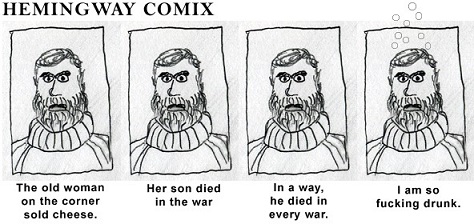|
Quote:
The Humane Society of the United States last year mailed more than 50,000 people an urgent message, underlined and in bold type: "Such horrific cruelty must stop and stop now!"
The cruelty in question was Internet hunting, which the animal-rights group described as the "sick and depraved" sport of shooting live game with a gun controlled remotely over the Web. Responding to the Humane Society's call, 33 states have outlawed Internet hunting since 2005, and a bill to ban it nationally has been introduced in Congress.
But nobody actually hunts animals over the Internet. Although the concept -- first broached publicly by a Texas entrepreneur in 2004 -- is technically feasible, it hasn't caught on. How so many states have nonetheless come to ban the practice is a testament to public alarm over Internet threats and the gilded life of legislation that nobody opposes.
With no Internet hunters to defend the sport, the Humane Society's lobbying campaign has been hugely successful -- a welcome change for an organization that has struggled to curtail actual boots-on-the-ground hunting. Michael Markarian, who has led the group's effort, calls it "one of the fastest paces of reform for any animal issue that we can remember seeing."
Vicki L. Walker, a state senator in Oregon, says she wasn't aware of Internet hunting until a representative from the society told her about it and asked her to sponsor a ban. "It offended my sensibilities," she says. The bill passed unanimously this year.
Melanie George Marshall, a Delaware state representative who sponsored an Internet-hunting ban that passed in June, considers her legislation a matter of homeland security. "I don't want to give ideas to people," she says, "but these kinds of operations would have the potential to make terrorism easier."
Even the National Rifle Association endorses the ban. "It's pretty easy to outlaw something that doesn't exist," says Rod Harder, a lobbyist for the NRA in Oregon who supported an Internet-hunting ban that took effect in June. "We were happy to do it."
John C. Astle, a Maryland state senator, angered animal-rights groups in 2004 when he successfully pushed to allow hunting black bears in the state. Safari Club International, a hunting group, named him the nation's State Legislator of the Year in 2005. But last year, working with the Humane Society, he sponsored an Internet-hunting ban that sailed through the legislature.
"If you're a dedicated hunter, you believe in the concept of fair chase," says Mr. Astle, who once shot a 13-foot crocodile in Africa's Zambezi river. Internet hunting, he says, "flies in the face of fair chase."
Still, Mr. Astle worried that the bill's wording "might extend the ban to legitimate types of hunting, as I'm sure those animal-huggers would like to do."
Internet hunting was first put forth as an idea in November 2004, when John Lockwood, an insurance estimator for an auto-body shop in San Antonio, launched live-shot.com. For $150 an hour and a monthly fee, users could peer through the lens of a Webcam and aim a .30-caliber rifle at animals on a hunting farm in central Texas. Mr. Lockwood said he wanted to help the disabled experience the thrill of hunting.
Pulling the trigger was a matter of clicking the mouse -- rather, it would have been, had a public outcry and concern from state regulators not forced Mr. Lockwood to abandon his plans. At the time, just one person, a friend of Mr. Lockwood's, had tested the service. He killed a wild hog.
"I thought that would be the end of it," recalls Mr. Lockwood, whose site now features ads for hunting gear, cars and life insurance.
Hardly. The Humane Society, calling Internet hunting a "sickening reality," urged state legislatures to outlaw the practice. Virginia became the first to do so in 2005, and others followed in quick succession. California also banned Internet fishing. Nobody is doing that, either. An Illinois bill outlawing Internet hunting is awaiting the governor's signature. That will bring the total to 34 states. In three of them, regulators imposed the bans.
Ms. Marshall, the Delaware state representative, realizes that nobody is actually killing animals on the Internet, but thinks now is the time to act. "What if someone started one of these sites in the six months that we're not in session?" says Ms. Marshall. "We were able to proactively legislate for society."
That sentiment bothers a fellow representative, Gerald W. Hocker. Of 3,563 state legislators nationwide who have voted on Internet-hunting bans, Mr. Hocker is one of only 38 to oppose them. He co-sponsored an earlier version of Rep. Marshall's bill in 2005 but took his name off it after doing some research.
"Internet hunting would be wrong," he says. "But there's a lot that would be wrong, if it were happening."
Nevertheless, the Humane Society depicts Internet hunting as an imminent threat. "Sick ideas have a habit of spreading," the group told members last year in a letter requesting donations "to fight this madness."
Mr. Markarian, president of the Humane Society's lobbying arm, concedes that Internet hunting is "certainly not the biggest problem currently facing animals." But, he adds, "It wouldn't take much for someone to start an Internet-hunting site offshore or in one of the states that hasn't banned it."
Mr. Markarian also argues that the society's focus on a potential threat has drawn attention to a current one: canned hunting, in which quarries are confined to a piece of land and are an easy kill. In Alabama last year, legislators shot two birds with one stone, banning Internet hunting and many types of canned hunting in the same bill.
Mr. Lockwood, meanwhile, says he's incredulous that his abortive scheme, an idea that came to him one afternoon while surfing the Web, has spawned such a legislative backlash.
"They didn't have to make a federal case out of it," he says.
Internet hunting is now, in fact, a federal matter. On June 14, two congressmen introduced H.R. 2711, the Computer-Assisted Remote Hunting Act. Although it had no apparent opposition, a similar bill died in committee last year, and it's not clear whether this one has a better chance at passage.
Republican Rep. Tom Davis of Virginia, one sponsor, says he first heard of Internet hunting from the Humane Society, which asked him to introduce a ban. "You just wonder," he says, "who would do something like this?"
|

 85239
85239 35211
35211











 )
)